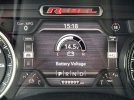Very interesting. On my 2021 Rebel, it has always stayed in the 13.8v-14.3v while driving. And even when I came to a stop and motor would turn off, the voltage stayed above 13.5v. Over the past few weeks, I started to notice the motor running really rough, like it was out of fuel when the auto start/stop would kick in to shut the engine down. But up to this point, no warning lights or messages. Skip to two day ago, I go to start it after being in the grocery store, and nothing. Just a bunch of clicking sounds, lights on the instrument panel lighting up then blackout. Had to jump the truck twice to get to an Advanced Auto to get a new battery. Installed a new H8-AGM and now when driving, the voltage stays at 12.9v to 13.1v. Also when coming to a stop now, and the auto start/start engages, the battery voltage drops between 12.4v-12.6v. Where as before, it would not drop below 13.5v. I’m completely stumped on what’s going on with it.














